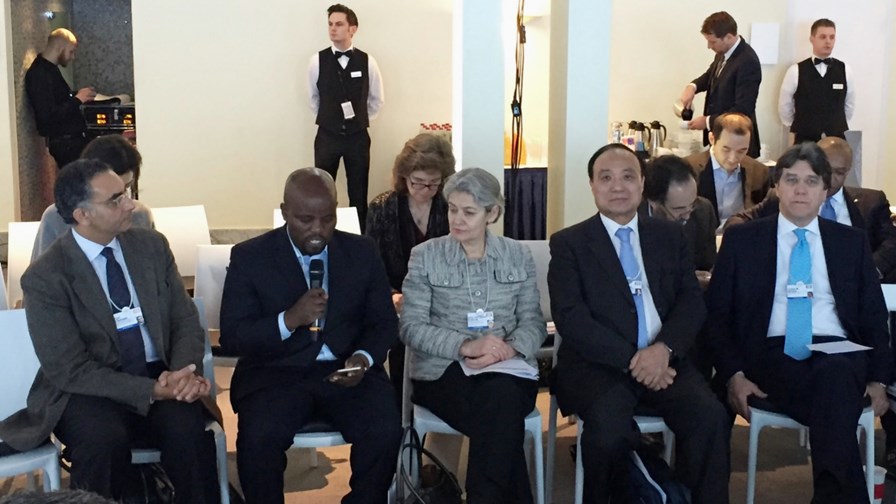$450bn is the cost to connect the next 1.5bn people, Davos delegates told, but is anyone listening?

The Broadband Commission in full flow at Davos © ITU
- Report from the ITU on behalf of the Broadband Commission
- Estimated cost of connecting next 1.5 billion people is $450bn
- Agreement to connect 60% of the world by 2020
- If broadband speed is doubled, GDP may increase by 0.3%
A new report from the ITU was published at a special session of the UN Broadband Commission for Sustainable Development held at the World Economic Forum in Davos yesterday. The discussion paper, entitled “Working Together to Connect the World by 2020”, is intended to highlight connectivity initiatives for universal and affordable access. As TelecomTV mentioned earlier this week, the Commission continues to struggle in its push to get broadband connectivity to the top of the global agenda, as a means for socio-economic development.
This new report could be seen as yet another valiant attempt at marshalling the evidence to support the Commission’s goals – one of many we’ve already seen and read. The Commission is never short of producing excellent research work, the problem is how to get policy makers and their political paymasters in emerging nations to sit up and take notice, and then, more importantly, take action. It’s becoming a something of a Sisyphean challenge.
However, this is not to denigrate the work done for the report, which collates existing research with the aim of stimulating a discussion to determine the investments needed to connect the world. Specifically, the report presents evidence to support three areas:
- the impact that broadband may have on the economy generally,
- the aggregate investment required to connect the next 1.5 billion individuals currently not using the Internet,
- the impact that a progressive enabling and regulatory environment has on broadband penetration.
Having looked at the evidence, the report makes three concluding statements:
- A 10 per cent increase in broadband penetration is likely to have a positive impact, and could raise economic growth by between 0.25 and 1.4 per cent. If broadband speed is doubled, GDP may increase, potentially by up to 0.3 per cent.
- If we invest $450 billion globally, we can connect the next 1.5 billion people
- A more advanced regulatory environment is on average associated with a higher mobile and fixed broadband penetration.
There is a huge number of cited examples and references, together with enough calculations and formulae to keep you busy for the weekend (and you really should try and read through this, if you have time).
The session at Davos concluded in the release of a joint statement by the group – which also included leaders from across government, industry and the finance sector, including the World Bank. Their statement notes that only 3.2 billion people are currently online, while 4.2 billion people remain offline. In the 48 UN-designated Least Developed Countries, Internet penetration is less than 10 per cent, falling to under 2 per cent in six of the world’s most disadvantaged nations.
The signatories pledge to make a concerted global effort to connect 60 per cent of the world’s people to the Internet by the year 2020, in line with ITU’s Connect 2020 Agenda agreed in 2014.
It also stresses the importance of meaningful access, noting that only 5 per cent of the world’s languages are represented online – an estimated 781 million adults are illiterate, and 100 million children have not had access to complete primary education, creating large pockets of the ‘digitally excluded’.
“The UN Sustainable Development Goals remind us that global development should be measured by the number of people being left behind,” said ITU Secretary-General Houlin Zhao, who serves as co-Vice Chair of the Broadband Commission. “Market forces have been sufficient to connect the world’s wealthier nations, where a strong business case for network investment can easily be made. Our big challenge now is to find fast and effective ways of connecting the next 1.5 billion people, who still lack the benefits of Internet connectivity, by 2020, and this will be the key focus of the Broadband Commission going forward.”
As we said earlier, and as the official ITU photo above illustrates, converting talk into action is incredibly difficult – despite the obvious benefits that we, in the telecoms industry, can see – especially when faced with so much apathy. One can’t help but feel that we’ll be pushing that rock up the hill for many years to come.
Email Newsletters
Sign up to receive TelecomTV's top news and videos, plus exclusive subscriber-only content direct to your inbox.




